#sci-fi writers have no sense of scale
Text
Sci-Fi Writers Have No Sense of Scale, Part 2
I have little reason not to, so here we go. I’m going to poke and/or rant at every single eye catch tech spec in GaoGaiGar. The vanilla King of Braves only; I’m not touching Final with its funky formatting.
Speaking of funky, let’s talk about Guy Shishioh.
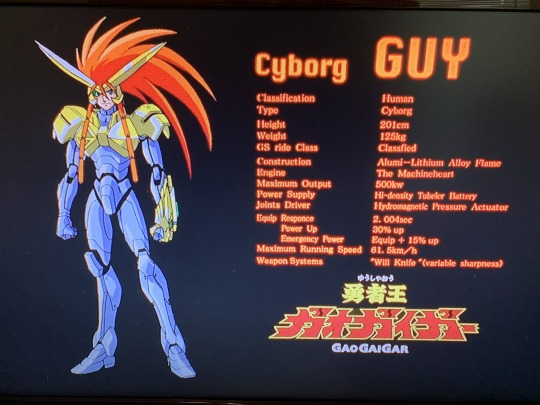
Guy Shishioh. The son of benevolent mad scientist Leo Shishioh. Astronaut and only person on board a super-classified shuttle at the ripe age of eighteen. Which means Guy is a chip of the old block and is a certified, certifiable genius.

We’ll skip over the obvious and hop straight to the bottom of the list: GS Ride Class Classified. This makes sense: Guy is an experimental cyborg. His very existence is classified, so of course his power source is classified.
Height: 201 cm. Just over six and a half feet tall. That’s a foot taller than the average, and around half a foot shorter than Soldato-J.
Weight: 125 kg. 275.6 lbs. A perfectly normal, respectable weight given his height and musculature.

Nothing really outstanding here, either. The Machineheart is a nice punk rock name band, though I’m fairly certain it’s a reference.
What does stand out to me is the power supply. Hi-Density Tubeler Battery. Tubeler, in this case, being a misspelling of tubular. The tubes are here:
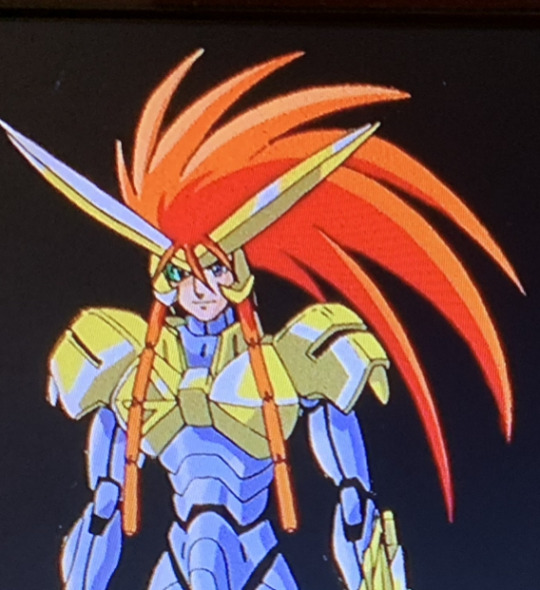
Yup. Guy’s hair is a bunch of batteries. Which has got to make his hair care regiment… shocking.

Equip response time of two seconds. Note, here, Equip does not mean “put on all the armor”. It means putting on the helmet, activating the scanner thing built into it, and turning on the hair batteries. The batteries give him a 30% boost to power - the listed Power Up stat - and he can gain an additional 15% up when activating emergency powers. All the stat boosts are in the amazing hair.
The actual time to put on the whole armor set is unlisted. But we’ll get more into the full armor later. For now, let’s hit the last point.
Speed: 61.5 km/h. That’s about 38 miles per hour using the imperial system. That’s as fast as a greyhound dog. Or if you prefer -
Guy is as fast as a cheetah.
Wait… Something must be wrong. The absurd giant robot show doesn’t have absurd stats for its protagonist?
Nope! There it is!

“But Iniora,” I can hear you asking. “How is a knife absurd?” Two words.
Variable. Sharpness.
The sharpness is tied to Guy’s will power. The greater Guy’s will, the sharper the Will Knife becomes.
That means Guy can cut down a door with the strength of his will alone.
#sci-fi writers have no sense of scale#GaoGaiGar#king of braves gaogaigar#Guy Shishioh#Gai Shishioh#Part 2 no sense of scale#Thank you for coming to my rant#Picture heavy#Couldn’t resist the running joke
16 notes
·
View notes
Text
man, i have Thoughts about "Demons”
first off, if goa’uld are carting off humans in every century after burying the abydos stargate, what was the point of burying the abydos stargate? and why didn’t any of these goa’uld bother to reconquer earth? or move the antarctic stargate to a more useful location? or bring another stargate with them? like i know that line of dialogue is probably functionally the writers covering their ass for using cultures other than pre-3000 BC bronze age types, but it sort of makes incoherent the fundamental premise of the series up until now, which is that the egyptian rebellion that buried the stargate was effective in permanently cutting off earth from goa’uld control
(on the other hand, we know some of daniel jackson’s conjectures turn out to be straight-up wrong later in the series--some other power could have brought these humans here, but i’m not sure in the context of the episode we’re meant to take this possibility seriously)
second--the show says their language is pre-chaucerian middle english, so assuming that that dating is reliable, we’re talking somewhere between the 11th century and the 14th. so, high middle ages. emphatically not the dark ages! if you wanted small isolated communities who looked out into a big, dark, scary world with fear, maybe anglo-saxons from the period of the major viking raids would have been a better fit--still kind of a silly stereotype of medieval culture and the medieval worldview, but when i think high middle ages, i think of big, emerging feudal states, of chivalry and romance, and of like well-connected church hierarchies that can do things like fight the investiture controversy against local monarchs.
third, the showrunners are pussies for not saying that jesus was a goa’uld.
23 notes
·
View notes
Text
The way that the Metkayina in Avatar: The Way of Water are adapted to life at least partially underwater highlights to me... maybe not necessarily a problem, but some wonky logic with the Yoko Tsuno comic series, particularly the album The Archangels of Vinea.
This particular album takes place mainly underwater, on the planet Vinea. The main characters are humans and Vineans returning to their planet after having left it about 2.5 million years ago. The story involves an underwater city, whose inhabitants do not spend all their time completely separated from the water (like with domes and covered walkways). They do swim in the water. Admittedly it's not really clear how much time they spend in the water on average, but it's not "no time at all."
It is also not established for how long this underwater city has existed, but considering Khany, a returning Vinean, seems pretty confident about the reason for the city existing, it may be safe to say that it has existed for at least 2.5 million years. In that timeframe, the Vineans living in the city haven't biologically adapted to living underwater (or if they have, it is not clearly shown). No webbed fingers, no fins, nothing. It is also implied that the inhabitants have little to no contact with cities on the land, so it's not like these features did not appear because of regular genetic input from Vineans who do not live underwater.
I didn't really have a problem with this... Well, I still don't, but the way the Metkayina have adapted to a large part of their lives being spent in the water, does highlight that Roger Leloup may not have a very good sense of timescales. Which is not uncommon, I mean, there is even a trope called "Sci-Fi Writers Have No Sense of Scale", but still...
Fellow Yoko Tsuno fans, do you agree with me or do you think I am just overthinking things, or maybe even misinterpreting parts of the album in question? I am open to conversation.
(Aka please talk to me about Yoko Tsuno, I know like zero other fans.)
#avatar#avatar 2#the way of water#avatar the way of water#metkayina#yoko tsuno#the archangels of vinea#les archanges de vinea#speculative evolution#sci fi writers have no sense of scale
9 notes
·
View notes
Text
Thinking About Ghost Writer's Library ( o.o)
Yeah, that's right folks! It's ya girl! Back on her bullshit, with PONDERING TIME. But like? GW? Is AT BEST? Somewhere around Victorian or Edwardian, given his aesthetic, right? And? Granted! It COULD be, he just vibes SUPER HARD with this Hot New Look(tm).
But like?
He is Baby.
They basically ALL are Baby. It's the... no, A(!) Baby area of the Zone. A place where sentient life is JUST sort of beginning to happen. On the COSMIC, INTERDIMENSIONAL, scale of things. What, after all, is a MERE few millenia? When the average is counting things by Eons? And even WORSE? When your ENTIRE COUNTRY and HISTORY is? What... CENTURIES?
Zygote. You are not but an infant. Back to daycare with you.
Which of course, leads the baby sitters. Even the occasional Adult. SOMEONES got to watch them. But it's not like THEY want to volunteer their eternity. They have Obsessions to follow. And there are A LOT of Baby Zone's to watch! More forming every day! The great dance of Life And Death etc etc, Yada yada!
Who's being punished? Make them do it! *Clockworks in long term plan*
But! Not the point here! Though fascinating to consider! The POINT? GW->Baby. His Library? Larger then then any Earth libraries, yes. But! Still SMALL. A BABY'S collection of books! Still growing. And for all his bragging and posturing? FAR from the Zone's BEST Library.
It likely doesn't even get to make the LONG FORM list.
Which Danny? Who is STILL banned? Quickly figures out. Because? Amity Library is... DECENT. It's working with the funding It's gotten dispite the damage ghost fights have done. Danny loves that library. He does. But... he also? Kinda has run out of things to READ.
And like HELL is he gonna BEG to enter GHOST WRITER'S Lair. Mister "Love Christmas or I'll torture you with it" can SUCK [REDACTED] and shove it up his [REDACTED BUT WITH VIOLENCE THIS TIME]. So? He asks, vaguely of course, Mr. Ho the librarian what he should do.
The man practically froths at the mouth at the thought that there is some BASTARD denying children books over PETTY PERSONAL BULLSHIT. Wants to meet this guy out back. "Talk books". Mr. Ho is like a bazillion years old and a tiny grandpa, he's amazing and Danny STILL kinda wants to be him when he grows up.
But since Danny won't let him deck Ghost Writer. He shows him how too look up other libraries in the area. Which... sparks An Idea(tm). He thanks his favorite librarian and races home. Makes a Bee Line for the Far Frozen.
Can he LOOK at the Infinity Map, Frostbite? He knows taking it is only for Important Events, but... why, you ask? Well...*explains*
Which is how he ends up, with a pen and paper, watching Trained Yeti Map Makers(tm) quickly sprawling out Map after Map, as Frostbite (who is apparently the only one AUTHORIZED to do this, who knew?) formally asks the Map in? Weirdly specific and oddly phrased ways, for the best libraries? Huh?
Ooooh! Frostbite is authorized because he's the only one TRAINED in the exact workings of the Map. Yeah, that makes a lot more sense. When Danny was using it, it dragged him at like Mach bajillion all over the place and he had to keep rephrasing things.
So? He can go now, right? Since he has the directions?
What do you mean "not quite"?
Danny finds out he needs an "Adult Escort". Because he is Baby. And much like children can not fly to Peru alone from halfway across the globe, so too, they can not LEAVE the baby zones to travel through Adult Territories where they could get Ended by accident, WITHOUT Adult supervision. Safety first!
D:< He just wants BOOKS!
Fine! Clockwork is old as BALLS! Older probably! He's LITERALLY TIME! How's THAT for OLD, huh?! Can he GO NOW!? He just wants to check out their ghostly sci-fi section! He's curious AF! He bets they have ALIEN Sci-fi! Come oooooooon!
Clockwork, of course, let's himself be dragged along. Because this is hilarious. AND going to terrify so, SO many assholes. Which is Funny :)
Danny gets his library card to *Unpronouncable without several neck bones humans do not have*, which is the size of Jupiter's BIGGER BROTHER. It isn't even the "Best" library. Just the closest. Danny has a manic... everything, the Fenton blood is strong with this one. So Many Booooooooks~!
And yeah, school books or whatever, probably a great learning resource.
BUT THE SCI-FI AND COMICS SECTION! It goes on for MILES! LITERAL MILES! *incoherent noises of joy*
Needless to say, the Librarians think he's ADORABLE. Such an eager reader! And so SMALL! A BABY! Look at his lil hands~! Be careful with the books, okay sweetie? Oh heck yeah! He WILL be!
And obviously? He gaurds those books with his LIFE. That's his Premium VIP Celebrity Gucci Bespoke Comics of The Multiverse Access! You'll have to pry it from his multi-dead, still smoking, Ended 5Ever hands!
The problem with THIS is?
Even with careful book covers? Those are CLEARLY glowing books. Like... day glow. Unnaturally glowing. The OTHER problem, is UNLIKE that baby GW? Adults can make their books multilingual. OMNILINGUAL. Is this book in French? Or Ainu? Yes. If it's YOUR language, then that's what you're reading in. Is it a bit clunky at times? With things that don't translate well, having to be explained in side notes? Yes. But better then not being able to read them at all!
And of course, comfort and repetition breed mistakes. You get too used to doing something. Forget you're supposed to be HIDING it. Maybe you go to college. Maybe the world moves on. You bring down a government agency with your friends. Become an infant king, much to the unspeakable alarm of the adults who SHOULD have been watching and protecting you. Maybe you have WORDS with them. Who's to say.
You're tired. It's been a long month.
You just want your coffee and a snacky lil treat. Something yummy for the you. Surely you've earned it, right? You've been good. So you take your sweet new alien sci-fi epic, your scrunkly feral Racoon lookin self, and you crawl like the half dying man you are. Towards the sweet relief of sugar and caffeine. Pride? You don't know her. Gib the coffee or you bite.
Unfortunately! There is some shitty "the Youth Today blah blah blah, let try and catch them of gaurd with loaded questions to prove my point and make a whole generation look dumb" reporter on campus. You see them out of the corner of your eye. They clearly think you are the weak link.
They are making their way towards you, mic raised.
Ah. Tragic, they have chosen death.
Before they can reach you, you raise your voice and not so much throw them under a bus, as drive the bus over THEM. Because THIS Coffee shop is the Punk hangout spot. And you've made casual friendly acquaintances with the six foot something, Sam clone from Scotland, whose life goal seems to be "Fight God".
And THESE fine folk DEFINITELY want an interview :) Have Fun, Thorn!
Needless to say, the clips go viral. With Danny sitting in the background, coffee and muffin achieved. Minding his business. Reading his glowing book. Which everyone ignores, on campus. Because EVERYONE knows Danny can make things glow! It's his weird minor power. Some lab accident in his teen years. NBD
But like... no body ELSE "knows" that. So it attracts attention.
Which would be FINE.... if he was reading an EARTH book.
But he's NOT.
And someone recognizes it.
Maybe it's Martian. Kryptonian. Could be Asgardian. Depends on the crossover you want! Because it could be ANY crossover! Lost books. Not just the Great Classics(tm) that people like to save. But the silly ones. The small ones. The equivalent of dime store novels and cheap drug store comics. Children's books. Banned books. The things Powerful People tried to erase from history itself. The things TIME tried to erase, with the fall of nations and the coming of war.
The destruction of worlds.
All of it there.
Imagine it. Standing on a planet, far from the world that was once your home, KNOWING in your heart that everything is gone. Everyone. That NOTHING but what you carry with you remains. And looking up one day to see, in the background of some average and silly video? Not "War and Peace" or "Great Expectations" or some other likely exported peice... but? Some youth reading that overly dramatic trashy sci-fi book that your cousins wouldn't stop raving about. The ones all the adults were SICK of hearing about.
It would NEVER have passed the bar for export.
It was silly and embarrassing but culturally significant.
It's... it's right there.
How?
Wouldn't the desperation that fills you be suffocating? Are there others? Is that an original? How is it here? How can he READ it? Who taught him? Who IS he? Is he one of us? Where? How? HOW?! Please. PLEASE!
And Danny? Would have no idea! :)c it's great~
@hdgnj @hypewinter @the-witchhunter @ailithnight @mutable-manifestation @nerdpoe
436 notes
·
View notes
Text
Welcome to another Drunk Skunk™ rant!

It is entirely possible that you have noticed: I love Warhammer 40k. At the same time, I hate Warhammer 40k... okay, hate is probably the wrong word, but let me explain.
40k is one of my favorite sci-fi settings because it is, hilariously, one of the few that actually manages to get the scale of Outer Space right. Most sci-fi writers have no sense of scale, but 40k is somehow able to convey the unimaginable, incomprehensible, terrifying vastness of Outer Space correctly.
Granted, I think it does this entirely on accident, because everything in 40k is exaggerated beyond the point of absurdity. The scale of everything is massive, every number has several zeros tacked onto the end of it, travelling anywhere takes months, years, even decades, and... that's just how Outer Space is. You can't exaggerate on what is already functionally infinite.
As a result, 40k as a setting has an enormous amount of potential. No matter how much we see of the Warhammer galaxy, we will only ever see a bare fraction of it, and there is always going to be more - and stranger - stuff hidden in pockets of the galaxy that has slipped entirely beneath notice for decades, if not centuries. Or even millennia!
But here's the problem I have. All of this potential? It is almost always completely wasted by Games Workshop. Nearly every single time, GW ignores the massive amount of potential in the setting they created, in order to focus on boring shit that nobody cares about like even more fucking space marines. It's infuriating.
As far as I'm concerned, there is no better example of this in the entire setting... than the Tau Empire.
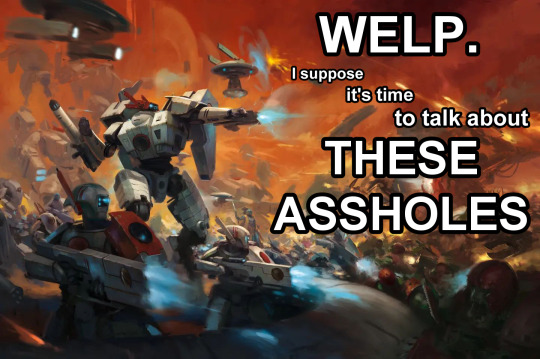
The Tau annoy me, but not for the reasons you think.
The most common complaint I see leveled against the Tau is that they are the "good" guys, and that they don't fit into the Grim Darkness of the Grim Dark far future of Grim Dark. This is untrue. Moreover: it was never true. Even when they were introduced in 2001 with their first codex during 3rd edition, they were not good guys.
I've always held the suspicion that people saw things like their catchphrase "The Greater Good" and they read things like "the Tau are not overtly hostile," and took all of that entirely at face value, because a sizeable chunk of this fucking fandom has no media literacy skills.
It still amazes me that Warhammer 40k - a game physically incapable of subtlety - has fans that miss the blatantly obvious.
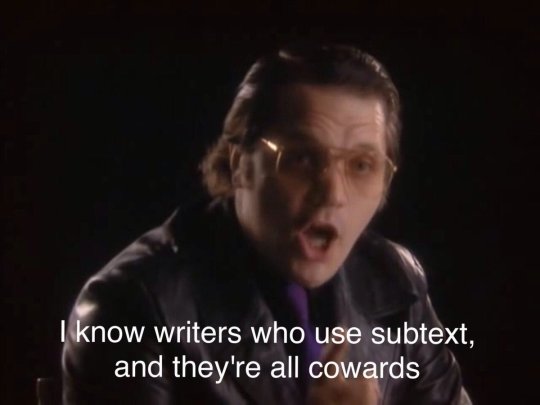
Before I get to my main point, let's clear the air on something right now: the Tau are bad guys, just like all the other factions in 40k.
If you were to place the Tau in any other science fiction setting, they would be a terrifyingly evil authoritarian space hegemony, with a firmly held belief of "Manifest Destiny" and constantly expanding the borders of their imperial holdings through the use of dirty tricks, illegitimate treaties, and good old fashioned military adventurism spurred on by their vast military industrial complex.
Yes, the Tau typically engage in diplomacy first, but that's usually only to establish a casus belli to claim the moral high ground in a conflict because the Tau are obsessed with appearances and love to play the Long Game. Yes, the average standard of living in Tau space is higher than the Imperium, but that's not a high bar. The Tau have a rigidly enforced caste system, and you can imagine how they deal with their "client races" who might disagree with that and even other Tau who refuse to fall in line.
Or have we all forgotten about Commander Farsight?
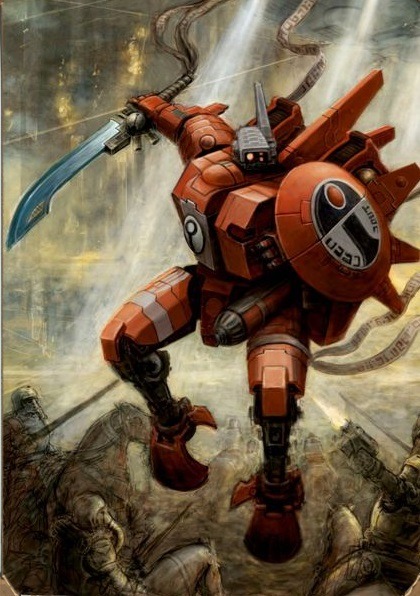
... I feel like I may have gotten a bit off track.
Okay, so: the simple reason the Tau annoy me is because there was a whole lot of potential there, and all of it has been completely wasted because Games Workshop doesn't seem to understand what made them interesting in the first place.
See, when the Tau were introduced in 2001, it was quickly established in the first codex that the only reason they even managed to make it to the "present" of 40k was due to a series of accidents that allowed that particular scrap of nowhere to slip beneath everyone's notice.
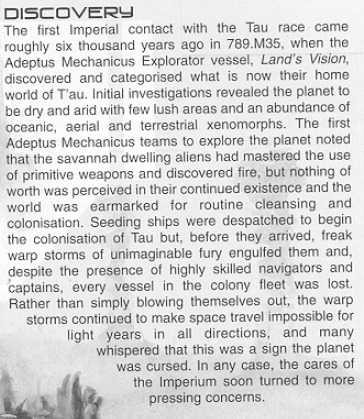
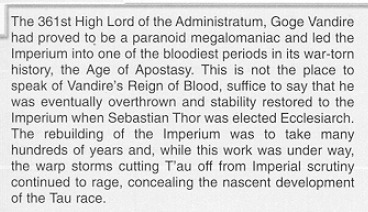
But here's the thing: we didn't really need that excuse. Every time we see maps of Tau space, it's always zoomed in to such an extent that it looks much bigger than it is... because, unlike every other faction, you can't have a full map of the galaxy that only focuses on the Tau, because it's always just a pinprick.
My personal favorite of these maps is the one from the 5th edition rulebook, but it's common with all of them.
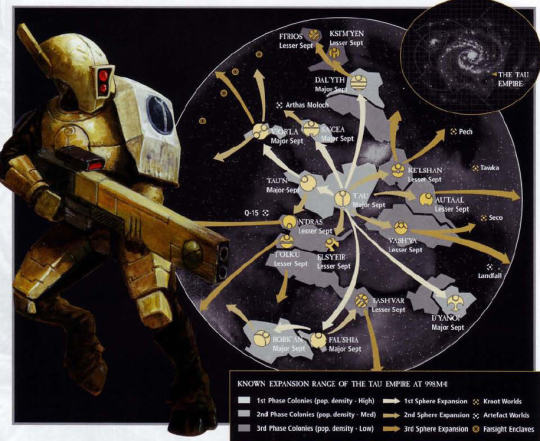
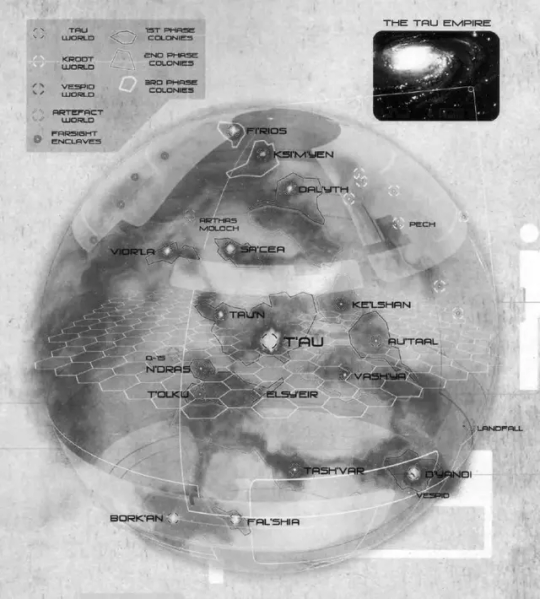

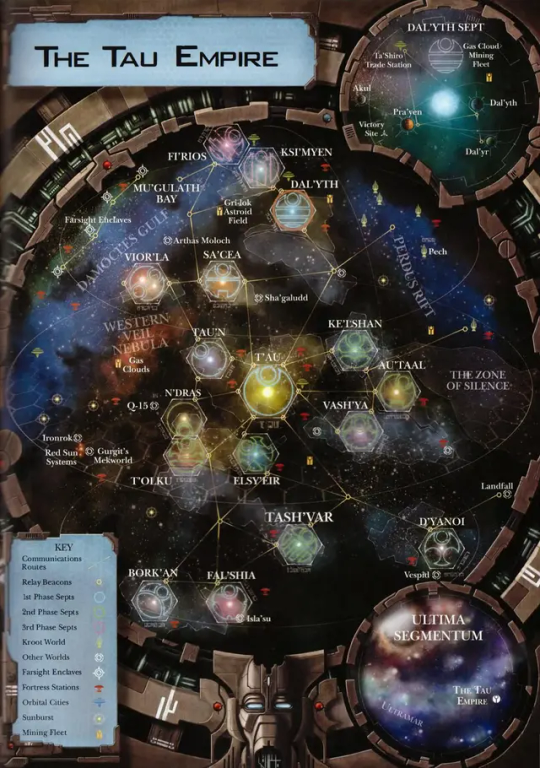
To put this into better perspective: Tau space is almost always described as a sphere about 300 light years in diameter, which is roughly the same size as "The Bubble," the cluster of human worlds centered around Sol, in Elite Dangerous.

And that, right there, is why the Tau should be interesting, at least to me. They represent what could exist in the hidden parts of the Warhammer galaxy that slips beneath everyone's notice because SPACE IS BIG. The Imperium of Man may technically cover the entire breadth of the Milky Way galaxy, and "hold" a million worlds... but there are 100 BILLION stars, and even more planets besides, in a galaxy that stretches 100 thousand light years from end to end.
That is A LOT of Outer Space that could hold any number of secrets and weird alien species that nobody would know about until somebody accidentally stumbles on them.
The Tau could have - should have - been a jumping off point, allowing Games Workshop to make the setting feel even bigger and far more strange than it already does. The Tau could've been the template for introducing "pocket empires" to the setting: smaller xenos armies that people could use in skirmishes, but without entertaining the illusion that they have the military projection power to stand up to the other factions on an appreciable strategic scale for an extended period of time.
And yet...
It fees like Games Workshop consistently misunderstands what should make the Tau interesting. Every new codex, every new edition, it feels like we get more and more of GW trying to be like "No, no! The Tau can definitely stand toe-to-toe with the Imperium of Man! They build tall rather than wide, and are ABSOLUTELY a threat to the Imperium, we promise!" when in reality the only reason the Tau are even still here is because the Imperium always has bigger problems to deal with.
There was the bit I mentioned earlier, where the Tau were initially saved after they discovered fire due to a mixture of freak warp storms and the Age of Apostasy causing the records to get lost. The Damocles Crusade ended in the Imperium's withdrawal because of the imminent arrival of Hive Fleet Behemoth. The Third Sphere Expansion was only successful because Failbbadon Abbadon launched the 13th Black Crusade at the same time on the other side of the galaxy, blew up Cadia, and split the galaxy in half with the Cicatrix Maledictum. Every single time the Tau do anything, a much bigger threat always shows up, and causes everyone to forget about the Tau until they inevitably go back to poking the monster.
Like, I know it's GW doing this, but sometimes it feels like Tzeentch is secretly pulling strings behind the scenes to specifically ensure the continued survival of the Tau, for no other reason than simply because the Changer of Ways thinks its funny.
And that's not even talking about how they've slowly morphed into The Gundam Faction.
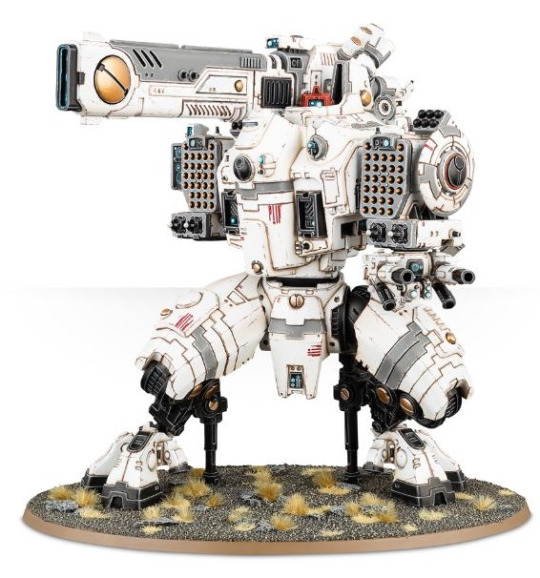
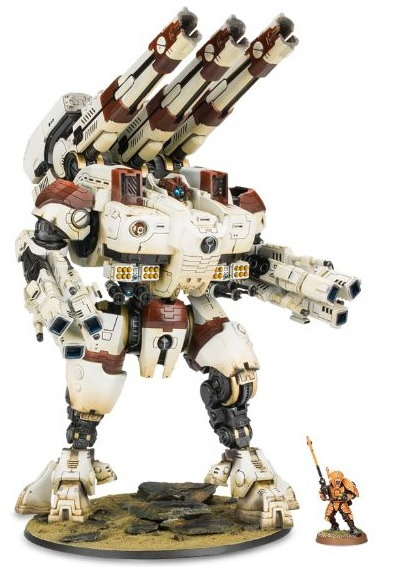
Like, it used to be that the Tau Empire was supposed to be this big conglomeration of many different alien races all working together. And there are token mentions of that in the 9th edition codex, with a big list of names largely devoid of context. But as soon as you see these guys in action on the tabletop, it's immediately clear what they're about. You only ever see Tau, and you only ever see Big Robots.
Which... it's not bad, the model range looks great, don't get me wrong. But it still feels slightly disappointing, when you think about what we could have had.
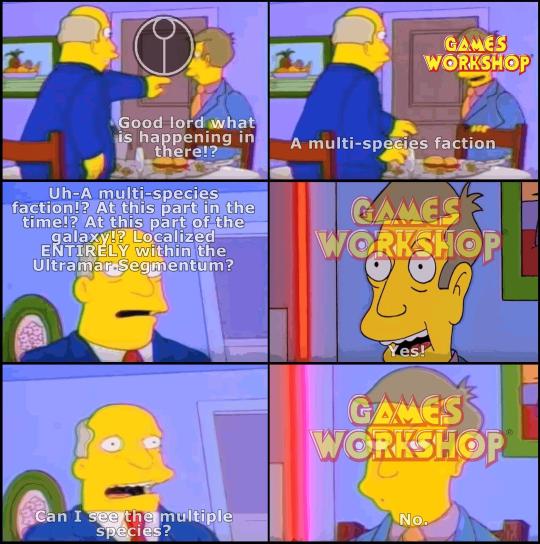
I love Warhammer 40k.
But I also hate Warhammer 40k.
Because I see all this potential... and, inevitably, I see it squandered.
And it frustrates me to no end.
#Warhammer#warhammer 40k#warhammer 40000#40k#wh 40k#Tau Empire#T'au#tau#Grim Dark#In the Grim Darkness of the Grim Dark far future of Grim Darkness there is only Grim Dark#Drunk Skunk Rant#wasted potential
125 notes
·
View notes
Text
"Ancient World Fantasy" Reading List
(A little context to start. If you just want book recs, scroll on down to the first image.)
As I’ve been getting into RuneQuest (Wikipedia link), one striking component of the culture and community surrounding the game is that they’re very into the lore of its fictional world, Glorantha. I’m saying this as a comparison to a game like D&D, where the game is spread across tons of settings with no real sense of obligation to keep things in line with earlier editions.
Glorantha’s canon and worldbuilding has been going on since it was published in 1978 without, as far as I can tell, any big reboots. Which means that, unlike D&D, where people are bringing in all kinds of influences and doing direct adaptions of Jane Austen books and whatever, the RuneQuest game remains pretty tightly tied to the original setting. (There have been some exceptions. But not many!)
But since I run games for people who have ADHD or aren’t interested in studying up, I’ve been looking at all kinds of inspiration to drop into the game. Here are 20 novels that are roughly “ancient world” or “Bronze Age” like RuneQuest and deal with people interacting with strange gods, tight communities, and a world without fast overland travel or transferal of information.
I’m presenting them alphabetically by author’s last name.
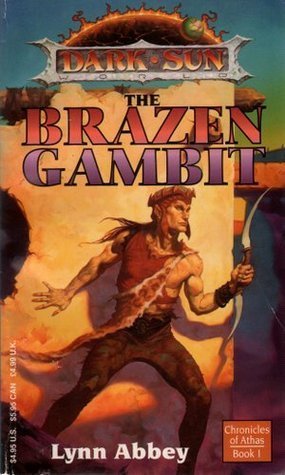
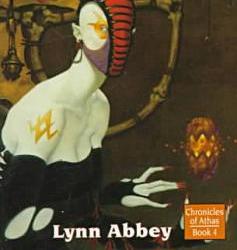
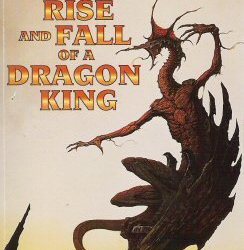
The Brazen Gambit, Cinnabar Shadows, The Rise and Fall of a Dragon King by Lynn Abbey
I'm sorry for starting this post off with licensed RPG novels, but these are good! And I don't mean "good for licensed RPG novels." I've read tons of them, and most are so bad! But these are actually fun. Good character development in a sword-and-sorcery world. It's also an ecological apocalypse world, with godlike beings oppressing common folks, leading to a lack of technological advancement and knowledge of the past.
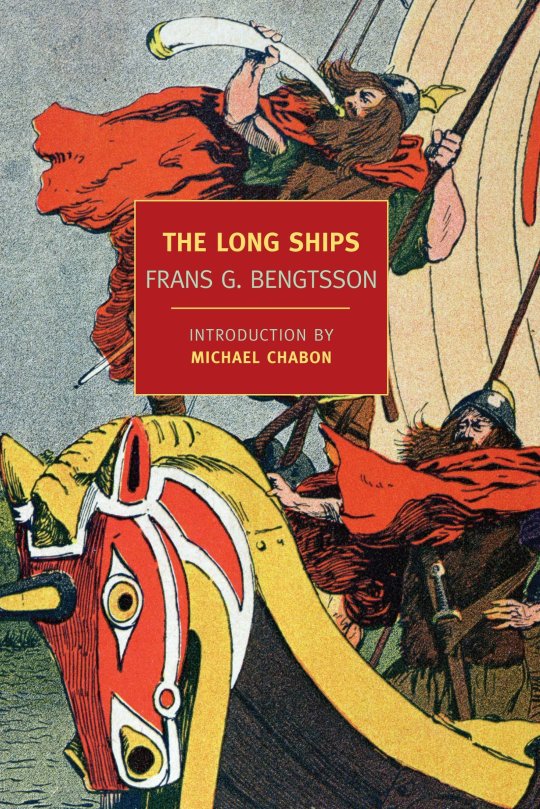
The Long Ships by Frans G. Bentsson
Written in the 1940s as a series of novellas, these stories take you on a tour of the Viking-era world, from Europe to the Middle East and beyond. Like a bunch of books on this list, this places them post-Bronze Age, so they're not officially "ancient world." But it gives a big spread of cultures, from the more clan-based Vikings to the bustling metropolises of Turkey. And it doesn't place any of them on any kind of linear advancement scale or whatever other gross way people "rate" cultures.
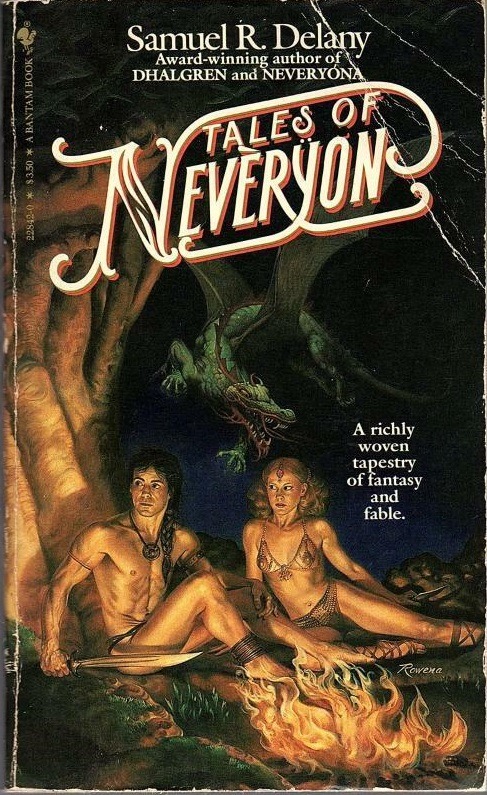
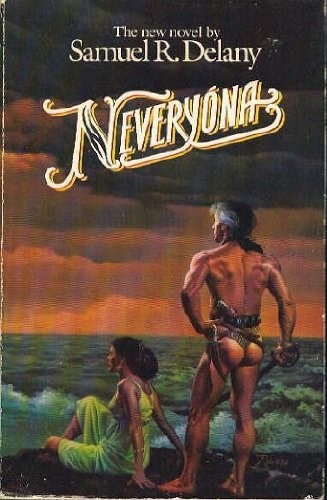
Tales of Nevèrÿon and Neveryóna by Samuel R. Delany
The master of weird sci-fi and gay historical novels, Chip Delany also wrote a fantasy epic. And it rules! Set on pre-historical(ish) Earth, these books describe the stories that maybe inform the myths we tell today? Dragons and slave revolts! A sort of "What if Game of Thrones was good?" series. Lots of good stuff about how people learn and how understanding expands.
I'm not listing the third book only because it's also a historical look at New York during the AIDS epidemic. It's an amazing book! But it strays from the "ancient world" aesthetic.
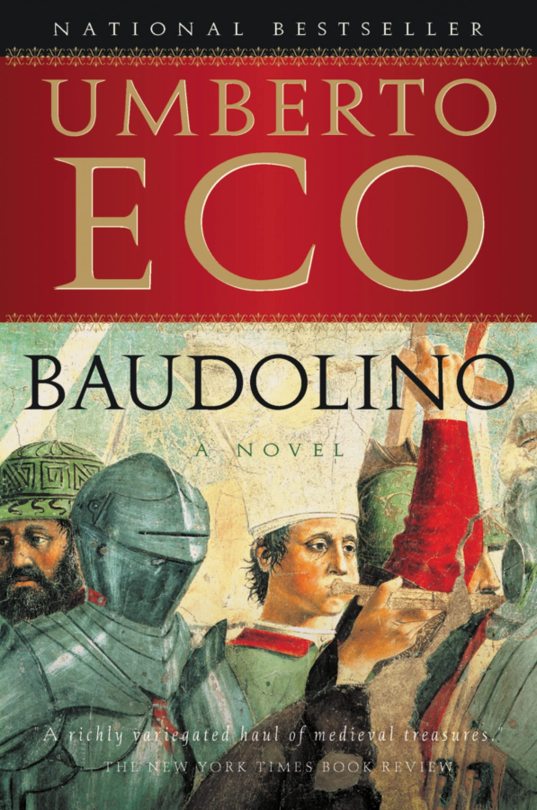
Baudolino by Umberto Eco
Another novel expressly set after the Bronze Age (this one starts in the 12th century). BUT it's about Medieval people's interaction with the knowledge they inherited from the past, specifically the myth of Prester John and the works of Herodotus.
I think I keep putting books like this on the list because roleplaying in a fantastical ancient world is not too far off from how Medieval people might have worshipped and referenced works from ancient Rome and non-European places.
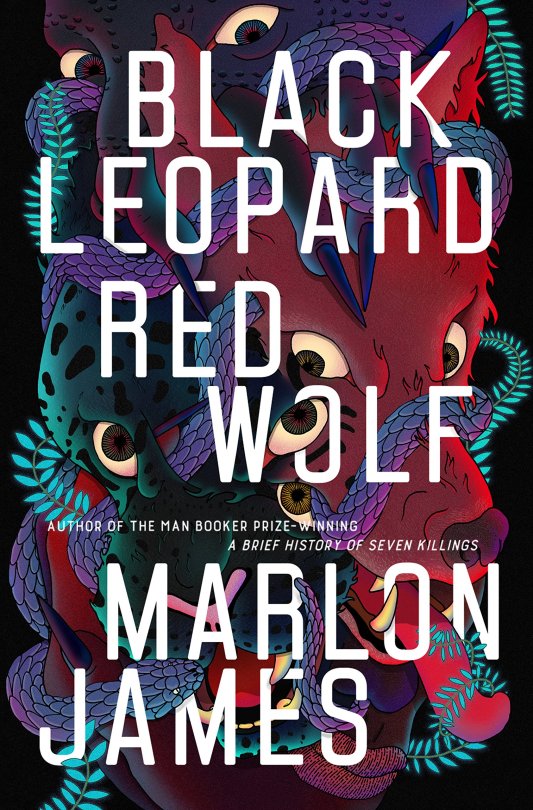
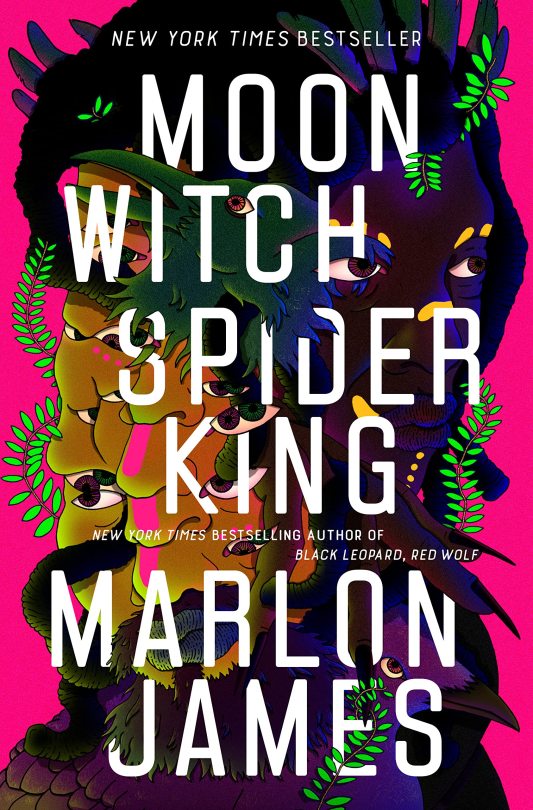
Black Leopard, Red Wolf and Moon Witch, Spider King by Marlon James
One of our best living writers! These are fantasy novels expressly set in a fantastical version of ancient/Medieval Africa. The books explore the same events from multiple points of view and are full of cool magic, awesome spirit combat, and a vast number of places and cultures that actively deconstructs most games's portrayal of fantasy Africa as a homogeneous place.
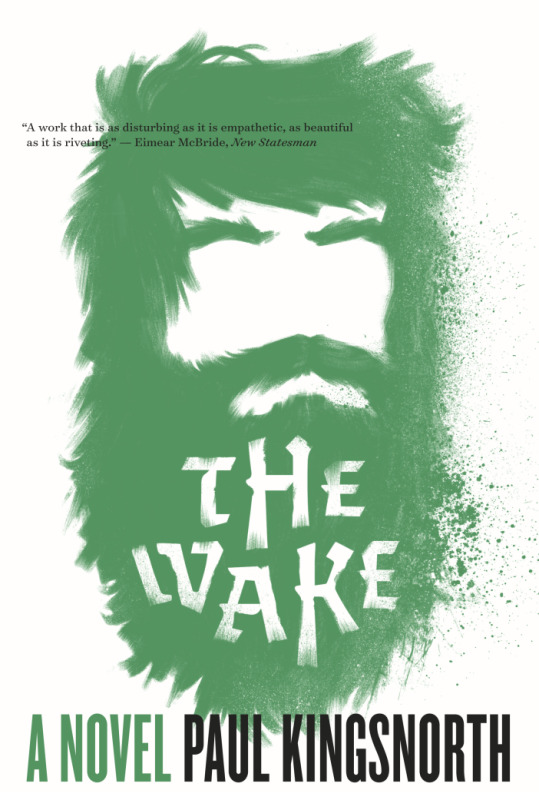
The Wake by Paul Kingsnorth
I think Kingsnorth has been outted as a sort of eco-fascist? I totally believe it, so feel free to skip this one. It's a historical novel set in England in 1066, as the Normans invade from France. It's written in a faux Middle English language and focuses on the lower classes and how they try to resist the invasion. A good reminder that "Medieval culture" (and especially the Renaissance as a time that "culture advanced") is often based on certain classes of society, such as rich people and/or men.
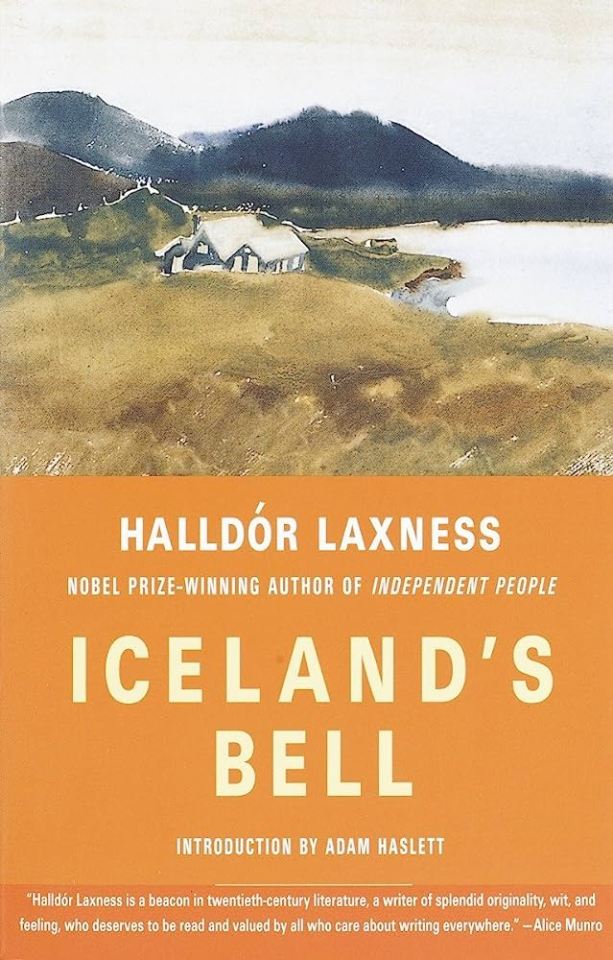
Iceland's Bell by Halldór Laxness
Speaking of how class intersects with technological advancement, this book is set in the 18th century, but it focuses on Iceland at a time when it was ruled by Denmark, and the lower classes there were under an enforced poverty. It's a book about how a rich Icelander was trying to recover the stories of his people in order to create a sense of national identity and resistance. But it's also a story about how a destitute man acts like a total weirdo when he's not allowed to fish in his own waters and is cut off from understanding his place in history.
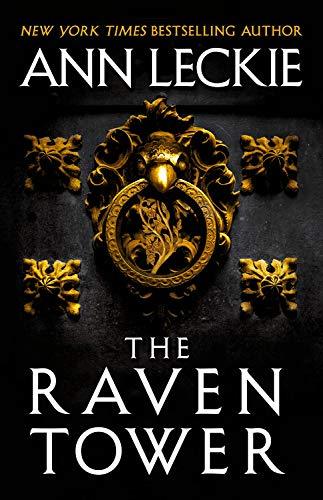
The Raven Tower by Anne Leckie
A big part of RuneQuest is people interacting with and enacting their gods. That's what this book is about! And it's about the strange vertigo that comes to people when they try to interact with the impossible timelines that gods exist on. Very good stuff.
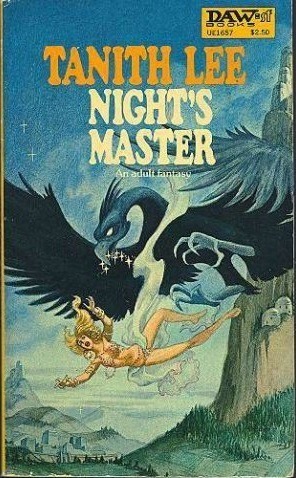
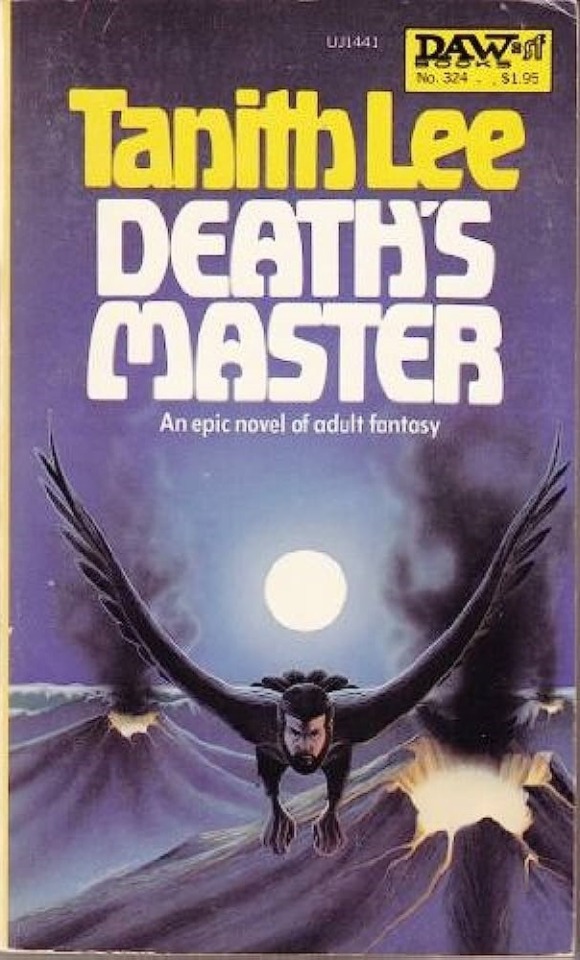
Night's Master and Death's Master by Tanith Lee
Ostensibly set on Earth back when it was flat and demons roamed the world, which is basically RuneQuest. Sort of like a series of hornier, gay bibles? With lots of gender fuckery, fun sex, and cool monsters.
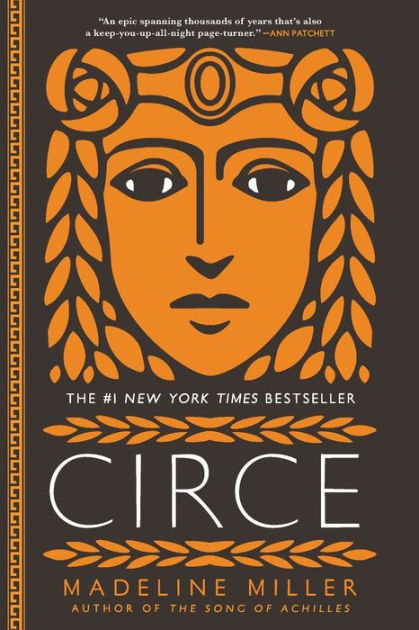
Circe by Madeline Miller
The story of the witch from The Odyssey, told from her point of view. Beautiful prose, tragic and beautiful characters, and a great share of mythical strangeness. Perfect if you want to learn how to run NPCs that are adversaries without being shallowly evil.
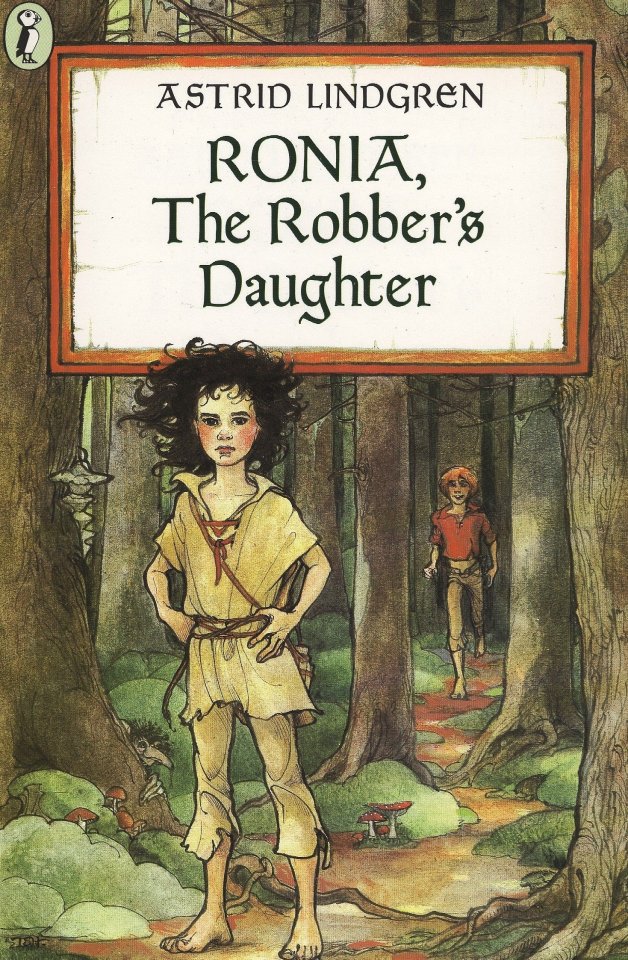
Ronia, the Robber's Daughter by Astrid Lindgren
Semi-Medieval again, but low class and vague enough that it could exist throughout ancient history. The daughter of a robber grows up in a tower full of robbers and generally has a wonderful time. Lots of weird monsters live in the woods, and there's a great starcrossed romance with someone from a rival robber gang. Perfect inspiration if you're running some cattle-raiding runs in RuneQuest; this is how to make robbers fun and sympathetic.
Read the book, watch the 1984 Swedish movie (which includes a great comedic scene of full-frontal dudity), and then watch the Studio Ghibli series.

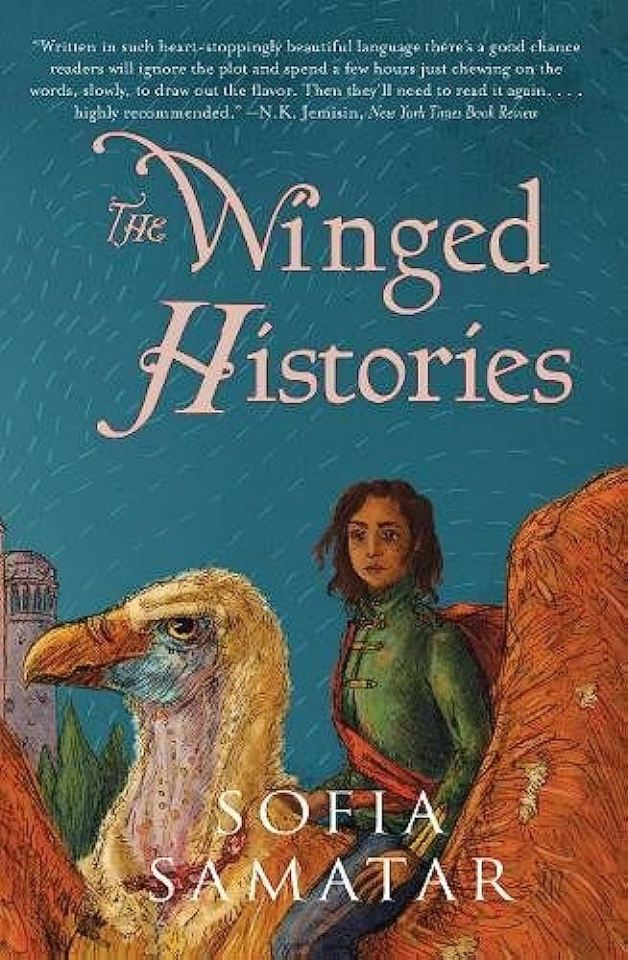
A Stranger in Olondria and The Winged Histories by Sofia Samatar
Set in a world of pepper farmers and religious fanatics who worship a mysterious inscribed stone, these books do a great job of showing how people might interact with religion, rival cults, and mystery rites. It also portrays literacy and learning to read in places where it's gated behind social gatekeeping. And once again, the prose is beautiful.
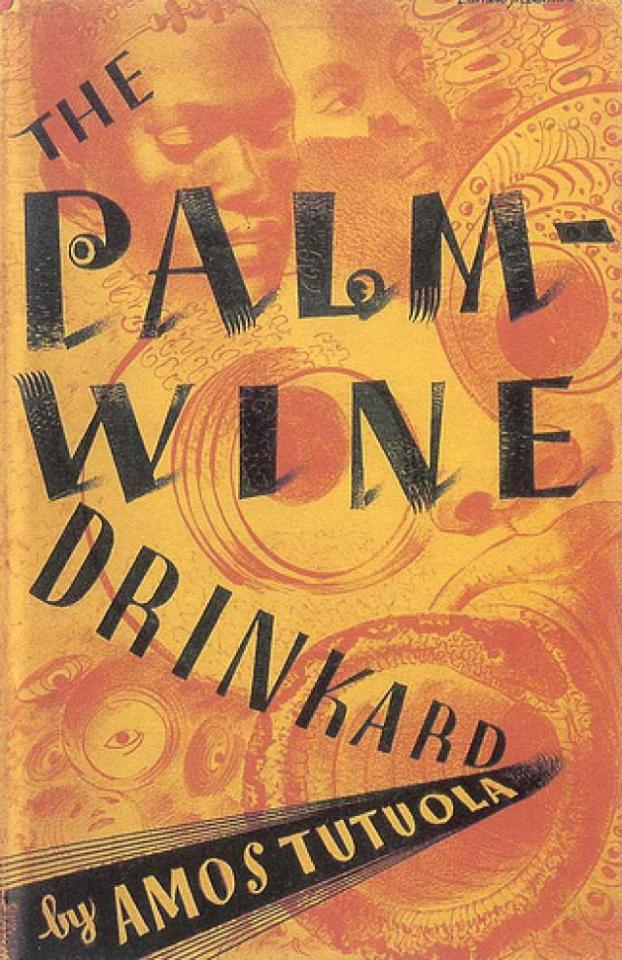
The Palm-Wine Drinkard by Amos Tutuola
The first African novel published in English outside of Africa, The Palm-Wine Drinkard is a funny, hallucinogenic story about getting drunk, stumbling through weird landscapes, and encountering fantastical spirits and people.
Tutuola also wrote My Life in the Bush of Ghosts, the inspiration for the famous(?) David Byrne/Brian Eno album. I haven't read it yet, but I'm keeping an eye out!
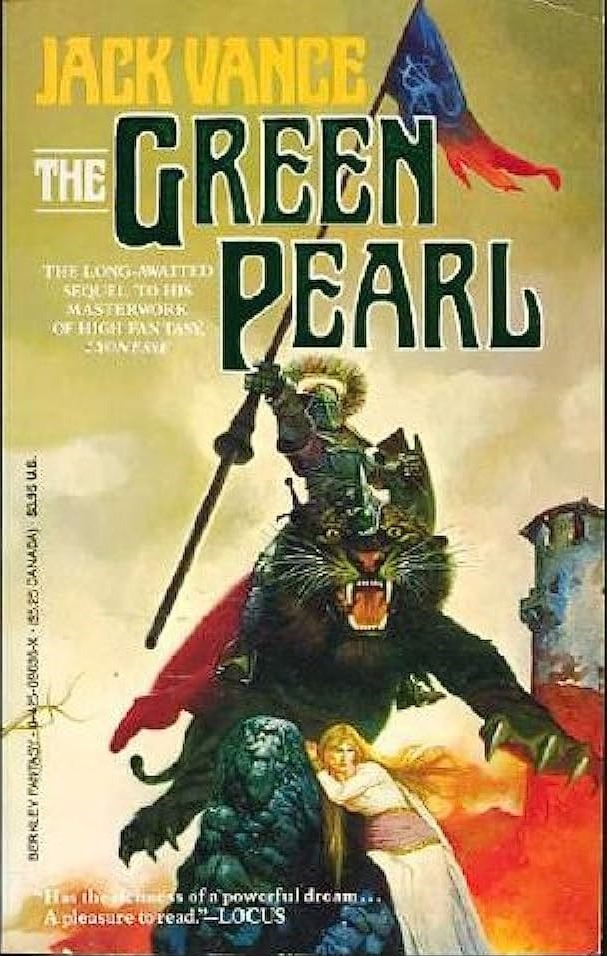
The Green Pearl by Jack Vance
This is a sequel to Lyonesse, which I haven't read because I love staring in the middle of things. Set around a mythical British Isles when Atlantis was still above the sea and part of the group of islands. Some great wizard shit, warring clans, romance, and a wizard whose name is fucking Shimrod (in case you need more convincing).
Those are my 20 novel recommendations! I'm gonna come back to add some nonfiction, comics, and myth resources for running games in fantastical ancient worlds. You can read SpeedRune, my ancient fantasy game, here.
206 notes
·
View notes
Text
Re-watching OSP's Trope Talk: Those Dang Phones and having Fable Thoughts TM
If you haven't seen the video, go watch it, it's really good. In it, Red breaks down how the technology of a certain time influences what its contemporary writers think of as normal, possible, and impossible. It looks at the sudden popularity of magic smartphones in fantasy and sci-fi and goes from there, looking at a century of stories. Again, go watch it, it's really good and this rant won't make much sense without that background. But I think there's something related that Fable SMP exemplifies that's also really interesting.
So everybody in Fable has a cellphone. They call it a communicator (because it descends from a larger mcyt fanon but that's a whole other rant) but it's a cellphone for all intents and purposes. Every character can communicate through instant text and audio calls. If they need to fly away and retrieve something, continuing a conversation is rationalized in-universe by turning on comms. The whole village is in a group chat, and has some of the same culture around that that exists in real life (mainly, panicking when you send what was supposed to be a DM publicly, or complaining about repetitive pings). Like Red's thesis in the video states, this is a reflection of what technology is normal to the cast.
But something else that carries over is the timeline of technological development that the cast considers normal. Because while every character has a cellphone that they use regularly, none of their parents do.
Whenever part of the previous generation's story is revealed, this technology isn't a part of it. Any communication between the characters is non-digital. Soul and Isla communicate through written letters. Enderian travels to the Nether to talk to Soul in person. All of Wolf's war reports are handwritten and, presumably, delivered by messengers. Even Ven's propaganda, while reproduced on a mass scale, is physical. The previous generation didn't have the same access to digital communication as their children do.
This is reflective of technological development in the real world. We've made leaps and strides in communication in recent decades. What used to be a fantasy of the elite is now accessible to nearly everyone on the planet. We don't communicate the same way our parents did.
People our age witnessed huge changes in communication from early childhood. I think we all grew up hearing grandparents and even parents talk about how bulky, complicated, and limited phones and computers used to be. When I was six, we still had a tape deck in the car and a record player at my Omoe and Opa's. My parents didn't get their first cellphones until well after I was born. Now everybody has Spotify on a touchscreen the size of three large crackers. It's not at the forefront of people's minds, but I think witnessing that in your key developmental years sticks with you.
So this major change was folded into what the writers thought of as normal too. Not only is it "Of course everyone has instant communication over distance," it's "Of course their parents didn't have that."
(And, if I can be cynically critical for a second, it does introduce a kind of crazy timeline of development in-universe. Like, my parents didn't have cells as teens, but they had faxes and landlines and shit. Isla didn't even have a telegraph.
TO BE CLEAR: I'm not saying this is a mark of bad worldbuilding. Haley and Sherbert made a normal low-tech fantasy world for the backstory and pulled from what they were used to for the present story. This sort of reflection of reality that Red talks about is unconscious, that's the whole bit. It's just a little silly if you think about it too hard.)
Anyway, I think it's interesting how fiction mirrors not just our present but our history. I'm interested to see how this sort of carryover develops. Gen-Z storytelling is still pretty relegated to social media and indie projects. I can't wait to see how the mediascape changes as our perspectives make their way into the mainstream. In the meantime though, I'll just sit over here thinking way harder than the cast intended about my beloved little cube people.
#fable smp#mcyt#anyway someone please write a fic where icarus has to explain how to use a smartphone to fable
8 notes
·
View notes
Note
Mtg Topic: The gradual expansion of the Magic IP into more obviously sci-fi elements, like cyberpunk and space worlds.
Magic hasn't really shied away from magic-powered technology over the years. Invasion was an alien invasion of cyborgs with spaceships and laser beams facing down giant mechs and bio-engineered warriors. Fantasy and Sci-Fi are a coat of paint away from each other anyway.
Magic is a hungry monster and they need to keep making new settings. I'm fine with it as long as the fantasy coat of paint is still present and keeps it distinct.
With that said, the introduction of Omenpaths everywhere does put a wrinkle in some of those elements that could partly uniformize these different settings if great care isn't taken.
I'm also afraid of the space set because as much as Fantasy writers tend to have no sense of temporal scale, throwing "thousands of years" around willy-nilly and acting as though nothing major in civilizations changed in the meantime, Sci-Fi writers tend to struggle with spatial scale (and sometimes temporal scale as a result). Space is really really big and it can be really hard to wrap your head around all that implies and all that needs addressed. The combination of the two could be quite something, not necessarily in a good way.
(Fantasy writers can also not have senses of scale for space. See also the recent comment that the Core of Ixalan was huge! And then giving numbers that'd give it roughly half the area of Luxembourg.)
9 notes
·
View notes
Text
Loki - Season 2 (2023) Review
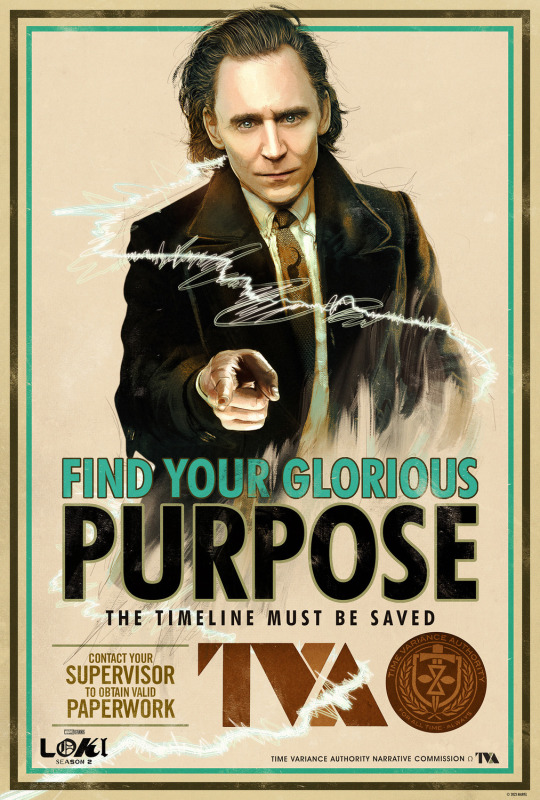
Ke Huy Quan is literally jumping from multiverse to multiverse. At this rate he should only be allowed to appear in projects about the multiverse, as one can never get enough of hearing him fast-talk sci-fi mumbo jumbo exposition. Ke Huy Quan - never change your wonderful weird self.
Plot: Season 2 of Loki follows the death of He Who Remains, with Loki desperately trying to figure out how to keep the multiverse from unraveling into another war and hold the TVA together.
I hear that the new The Marvels film is a turd. In fact, as of late all that Marvel has been doing is turd after turd, as if the entire studio had suffered a collective food poisoning and is now regurgitating and also releasing crap out of their bowels. Since Endgame they have really struggled, with of course some exceptions such as WandaVision, No Way Home, and Guardians Vol. 3 sticking the landing, but those are far few amongst a plethora of oversaturated dull superhero content. In this day it's all about quantity over quality, and the cracks are finally beginning to show with the negative critical response and diminishing box office returns.
So I am more than surprised to reveal that the new season of Loki that has just completed its run on Disney+ is actually really good. Great characters, solid storytelling, exciting twists and turns, well-done visual effects (another aspect lacking in other recent MCU projects), an exhilarating music score, and great production design - it's all there. I read somewhere that season 2 of Loki is the first MCU project to not undergo any reshoots, and it shows. The writers evidently had a solid plan from the beginning and stuck to it, and thus the results show. What a plan it must have been. I can only imagine what kind of Charlie Day-level board of post-it notes and interwoven lines they would have had to organize the time-dealing narrative. The writers really manage to deal with a big-scale multiversal time-traveling scope, yet at the same time succeed at keeping things grounded by focusing on the character development of its central cast.
I had mixed feelings about the first season of Loki. I enjoyed some ideas, the Tom Hiddleston/Owen Wilson pairing was enjoyable and the visual palette stood out. But there was plenty of useless filler, the character of Sylvie annoyed me to no end, and it only truly found its footing in the last couple of episodes. Oh, and Richard E. Grant's cameo was great, but when has Withnail not been good?? In comparison though Season 2 feels like a full-fledged pay-off to the events of the first season. So much so that it never really felt like any episodes had unnecessary junk in them. Each episode was filled with lots of stuff going on, with the show moving at a very fast pace. I'd say the first half of the season takes some time getting into, so the showrunners could have patched it up more, but the second half definitely balances it out. The production design also seems to have improved this season. The set pieces were all very well designed, and the detail put into the look of the TVA felt like this show had the budget of an HBO Max Game of Thrones-type series.
The cast are all great. Luckily there is less of Sylvie (no offense to the actress) and that weird Loki-to-Loki romance subplot is largely ignored thank the heavens. Also the writers must have taken on the feedback from the previous season and have now given us more buddy time between Hiddleston's Loki and Owen Wilson's Mobius. Those two together are hilarious, and share some of the best moments this season. Tara Strong gets more chance to lean into the creepy element as the eerily cheerful voice of Miss Minutes. Ke Huy Quan and Eugene Cordero manage to deliver the scientific exposition in an entertaining and breezy way, even if what they re saying doesn't always make sense, but like who's looking for logic in the MCU? Gugu Mbatha-Raw returns as Renslayer, and honestly, the season could have done without her. The writers seem to desperately want to include her, but her character has hardly anything to do. Rafael Casal as a rogue TVA agent also didn't work for me. The chap's acting was way too over the top and silly.
Naturally one must touch upon the Majors problem that Marvel is facing. They are really leaning into Kang as the Big Bad with more set-up than Thanos has ever had, yet the actor playing him is in some serious legal trouble. So will be interesting to see how Marvel gets out of that one should the court find Jonathan Majors guilty of the accusations, but nevertheless let's talk about Kang in this show. The essence of Kang is felt throughout the entire season, and naturally, some variants are involved. Primarily the character of Victor Timely, and look, I'm hearing many rave about Majors' performance as Kang but I'm not buying it. As Timely he's this blubbering awkward scientist who comes off way too over-the-top. At the end of the season Timely does find his groove and I actually began liking him, but as a Kang variant, he's not threatening at all. In Ant-Man as the Conqueror, he is just this macho man with a big mouth but not much else to him. And then all those variants in the Quantumania credits scene where they're all dressed up as if they are part of the circus, and then many of them screaming like apes.....like c'mon. He's supposed to be the Big Bad, but whatever Majors and the writers are doing, I don't get it. Except when it comes to the Loki season 2 finale...
So the finale of Loki season 2 is easily some of the best television work Marvel has done, at least in regards to the Disney+ shows. It brings not only the events of the entire Loki show to a satisfying close with a sense of finality that hasn't been felt since Avengers: Endgame, but also gives Tom Hiddleston's character such an incredible arc, from seeing how he started out back in the first Thor film, and how his intentions and persona have changed, yet the irony of life still plays its part and where his character ends up at the end of season 2 of Loki was really awesome. In fact, it's such perfect closure to his character that I don't believe we need to see him again. I get that the Marvel machine would naturally want to bring him back down the line, however… I don’t think it should happen. As much as I do love Tom Hiddleston as Loki, I think sometimes things need actual endings. And it was such a fitting yet tragic arc for Loki that I think adding anything else to the character, whether a multiversal variant or what have you, would only cheapen what they accomplished last night. As for the aforementioned comment about Kang, in this finale episode was the first time where we actually witnessed a Kang variant have some real power that could have big ramifications. Not the kind of cheap physical macho stuff they had in Quantumania - nope. In the Loki season 2 finale his power was more of knowledge and skill, which depending on how they take it from here could be really interesting.
Loki season 2 is a visual and narrative treat for any sci-fi time-travel pop culture fan and is very much a reminder that when the time and creative effort are put into a project, Marvel still has the potential to deliver. It is a shame then that these occurrences are happening less and less, but nonetheless, this show is worth celebrating. Also, we finally got to see Owen Wilson's Mobius on a jet-ski! That is what I call fan service done well!
Overall score: 7/10
Season finale score: 8/10

#loki#loki season 2#marvel#marvel cinematic universe#mcu#mcu loki#tom hiddleston#owen wilson#key huy quan#jonathan majors#gugu mbatha raw#tara strong#disney+#kevin feige#action#adventure#fantasy#glorious purpose#science fiction#multiverse#time travel#loki season 2 review#streaming#tv series#loki season 2 finale#loki series#superhero
13 notes
·
View notes
Note
Frank, have you watched the show Buffy the Vampire Slayer, and its spinoff series Angel? If so, what did you think of the characters? What do you think of Season 4 of Angel?
Yeah, I watched them both, although I dropped off around the end of Season 3 of Angel.
They were fun, and I liked both shows a lot, but they have the problem of every popular cult-hit TV show from the last decade -- namely, that they end up relying on the sheer novelty of their original premise to keep viewers watching (Buffy: "14 year old girl with a crush on Angel the vampire fighting monsters and demons with a sword!" etc. etc.). And the novelty of this premise does wear out after a while, forcing writers to get more and more inventive with the plot twists that they introduce and causing the show to start feeling kind of strained (in Buffy's case the scale of plot twists was limited by the fact that you couldn't lose all of the main characters in one fell swoop, but in Angel this limit doesn't apply). I think the show also suffered from the fact that the writer of the initial pitch ("a girl fights demons with a sword! . . . and she's (arbitrarily) bad at it") was not the show's main writer and the actual plot didn't take shape until she was gone, and the other writers, were working full-time on the show.
Buffy did start out strong but it kind of collapsed into its own formula, which is a shame. Angel was a bit more inventive, and had a definite sense of going somewhere, but as I said I only got up to season 3.
One more comment is that Buffy and Angel was really an extremely good example of one of my main problems with sci-fi/fantasy. Namely, all these "gods" are lurking around in the background who can wipe out entire civilizations with a snap of their fingers and never even seem to have any trouble getting the spells/technology together to do so. It's all cool and mysterious as long as everyone's a slave to the story, but if you sit back and think about it for even a moment it stops being cool or mysterious.
Buffy is very good, but nothing compares to this idea, of a god with the power to reshape reality at a whim, even if the god is always far away, inaccessible to the heroes, and never has to actually use that power to do anything:
A wizard who lives in a world full of people who know he is a wizard and are constantly inventing new uses for the fact that he is a wizard. A wizard who is aware that he is a wizard -- and knows that the power is there to be used and can be used wisely -- but is afraid to use it to accomplish anything because the idea of using it for himself (the selfish wizard) disturbs him, so he avoids it for a long time and only finds the courage to use it when it is absolutely necessary.
21 notes
·
View notes
Text
'GamesRadar+ Verdict *****
Inventive, unsettling and the perfect vehicle for its two stars, 'Wild Blue Yonder' is event TV at its best, and everything you could want from an episode of Doctor Who.
Back in 2005, showrunner Russell T. Davies kicked off his first stint in the TARDIS with an Earthbound adventure featuring a familiar villain (malevolent mannequins the Autons in ‘Rose’), followed by a trip to the furthest reaches of time and space in ‘The End of the World’. After bringing back fan-favourite comic-book creation the Meep in last week’s ‘The Star Beast’, he’s followed a similar trajectory by materialising the Doctor and Donna on the literal edge of the universe.
That’s where the similarities end, however, because while ‘The End of the World’ was a fun, knockabout introduction to some of the weird and wonderful aliens who call the Whoniverse home, ‘Wild Blue Yonder’ is a considerably darker affair. In fact, the second of the three 60th anniversary specials revels in bringing scares and some genuinely unsettling moments to Saturday evening TV – just as Doctor Who should.
Davies has said in pre-broadcast interviews that he’s been trying to keep the plot under wraps ahead of transmission, and going in cold really pays dividends here. Even the opening of the episode offers few clues of what’s to come, as Donna’s strategically spilled coffee plays havoc with the TARDIS’s navigational systems, facilitating an entertaining encounter with Isaac Newton and history’s most famous apple. But that’s just a minor detour en route to a spaceship where things are so irregular that the out-of-sorts TARDIS does a runner – the Doctor’s blue box may have a fancy new interior, but it’s still as eccentric as ever.
Much has been made of the influx of Disney Plus money to the show’s production budget, and it’s used to spectacular effect here. Running through corridors has always been a big part of the Doctor Who brand, but the Time Lord doesn’t usually have to negotiate seemingly endless corridors that mysteriously reconfigure themselves on a regular basis – although they’re obviously CG, the ambition and scale of this alien craft’s design compensates for any flaws.
And there’s something seriously weird going on here, as the episode refers back to the horror movie manual to ramp up the tension in an ingeniously family-friendly way. Why is there a rusty robot (who looks a lot like Marvin in the Hitchhikers Guide to the Galaxy movie) loitering in the corridor? Why are there no lifeforms on board? Why did an airlock open and close three years earlier? Why are there no stars outside? What’s that banging? And why has the air got a little bit chilly all of a sudden? Director Tom Kingsley also adds to your growing sense of unease by making the camera peer through holes or round corners, as if the Doctor and Donna are being watched.
When the antagonist(s) are finally introduced, it takes you a few moments to realise that something is very, very wrong. And the big reveal, when it comes, is both grotesque and hilariously funny, body horror with a comedic spin, as if David Cronenberg woke up one morning and decided the one thing his movies need is more slapstick. There are also echoes of vampire mythology, Alien(s) and even – in one wonderfully freaky moment – The Exorcist.
In fact, there’s so much going on here that it shouldn’t really hang together. That it does is a testament to Davies, who – after more than a decade away from Who, during which he’s written the brilliant A Very English Scandal, Years and Years and It’s a Sin – is arguably an even better writer than when he left. ‘Wild Blue Yonder’ segues seamlessly from a Thunderbirds reference and an ongoing gag about Newton’s discovery of “mavity” to jump scares and emotional character beats – and then back again.
The sheer volume of ideas is also remarkable, as Davies burns through several sophisticated concepts that would – on most sci-fi shows – be enough to power entire episodes by themselves. Indeed, the idea that 21st century human language lacks the capacity to comprehend the universe having an edge is a genuinely beautiful piece of writing.
Most importantly, however, “Wild Blue Yonder” is the perfect vehicle for stars David Tennant and Catherine Tate, who carry the entire episode, and – for various reasons – get to show sides of their roles we’ve never seen before. As one of the few new Who companions who’s never been in awe of her Time Lord chum, Donna’s never been afraid to tell it like it is. But there’s an extra dimension to her now that she has a family, and is even more desperate to get home than she would have been before. The Fourteenth Doctor, meanwhile, has changed significantly during the three lives he’s lived since they parted ways, and is definitely still carrying serious baggage from the Flux and the Timeless Child revelation.
They’re such a perfect duo that you want to spend as much time with them as possible, making this three-part reunion feel painfully short. The episode’s conclusion – featuring a lovely cameo – and “next week” teaser do enough to suggest they’re going out in style. But after the brilliant “Wild Blue Yonder”, it’s clear that saying goodbye for a second time is going to be just as cruel and painful as it was all those years ago.'
#Doctor Who#Tom Kingsley#Russell T. Davies#Timeless Child#Flux#Wild Blue Yonder#60th Anniversary#David Tennant#Catherine Tate#Donna Noble#The Star Beast
6 notes
·
View notes
Text
Sci-Fi Writers Have No Sense of Scale, Part 3
The more of these I do, the more I start to realize that the character designers of GaoGaiGar did have a sense of scale to start with. Then the series suffered power creep, the challenges faced by The Heroes increased in crazy, and things progressively ballooned into the outlandish.
…setting aside a giant robot anime targeted at kids is by default outlandish.
No jokes about doors this time, unless you mean a 10 meter (32 ft) tall cat door. That’s right - it’s time for Galeon!

Galeon doesn’t really have much in the way of insane stats to speak of. They’re all relatively nice, normal, and tame, for a giant robot cat from outer space. Galeon is also know as the ultimate robot stork substitute who delivered baby Mamoru safely to Earth.

Nothing really stands out here. Galeon is classified as a Brave Robot as that’s what Three G classified all their giant robots as. The show is also part of the Brave series, so it makes thematic sense. The type also makes sense as it’s Exactly What It Says on the Tin.
Height and weight also come in at “yeah that makes sense” levels. 9.8 meters in height works out to just over 32 feet. 112.5 tons works out to 225,000 pounds. Big Cat is Big.
I’m also going to skip over the next part:

Except I will make one call out. “Weist” thrust is, I believe, “Waist” thrust, as in the jets are on Galeon’s waist. That’s why there’s a x2 next to thrust at -
Wait hold on. 525.5t works out to

Forget what I said about Galeon being normal by giant robot cat standards! 1,157,426 pounds of thrust. From each engine on his hips. Forget the fluff text about the green tornado providing particles of protection. Galeon putting out the same thrust as the space shuttle’s rocket is what allows for Transformation as a Free Action.
With that much thrust, what’s his speed?

Max flying speed is 2.5 Mach. That’s 1,918 MPH. As a refresher, Soldato-J, who I remind you is pretty much human shaped and sized, has a max flight speed of 12,427 miles per second. Second!
I don’t know if that makes Galeon the silly, or J even sillier.
Anyway - it takes under a second for Galeon to boot the Fusion program with Guy. It takes 23 seconds for Final Fusion, which they use as the in-universe excuse for reusing the stock footage so much. He can run at 40 km/h (about 25 MPH) which is slower than the average freeway.
Galeon, Guy’s partner… he doesn’t have much. But he makes due with what he’s got.

Here’s the last little bit of the kitty’s tech specs. Nothing stands out as particularly notable - at least not compared to the stuff above. Galeon’s fangs and claws are officially his weapon systems. I would not bet on a giant cat door standing up against those.
#GaoGaiGar#No sense of scale Part 3#Sci-fi writers have no sense of scale#Galeon#Image heavy#TV Tropes references#No door joke this time#Giant robot cat
5 notes
·
View notes
Text
while we can attribute some of the confusion to the imperfect picture that the tau'ri have of the ancient milky way, the writers of the show also just clearly fucked themselves over by given the alteran civilization a nonsensical timeline. ok so they leave their home galaxy tens of millions of years ago, reach their peak in the milky way ~5-10 million years ago, before their civilization collapses due to a plague, and the survivors depart for pegasus
where they live another few million years, until abandoning pegasus 10,000 YBP. meanwhile during the period where they were supposed to be part of the Alliance of Four Great Races in the milky way, they are not actually in the Milky Way? because we know that the Asgard civilization is less than 100,000 years old, and the Ancients left monuments from that era in the Milky Way, when they were supposed to be in Pegasus
and their technology across literally tens of millions of years and three galaxies seems rather static--oh sure, cosmetically it changes a lot between Destiny and the different generations of stargate, but it functions the same. and Lantean battleships from the end of the Lantean-Wraith war, after millions of years of technological progress, seem at best to have technological parity with, like the Asgard? even though we know the Asgard never equalled the ancients technologically, because Thor says they've been studying Ancient knowledge caches as long as he can remember and have barely scratched the surface.
and then by the time they return to the Milky Way as a handful of stragglers, the goa'uld have already risen to power, and the ancient are just like "welp, nothing we can do about that, guess we'll just ascend."
i know this is mostly Sci Fi Writers Have No Sense of Scale, but they really could have fixed most of these problems by not trying to one-up themselves with the timescales involved and having all this happen over a period of 1 or 200 thousand years, rather than tens of millions. you could even put the floruit of the Ancients millions of years ago, before antarctica was finally covered in ice, as long as you were clear that the Ancients as the Asgard knew them were a minor subpopulation that hung on after the plague wrecked their shit, but was content to live in an introspective out-of-the-way style like the Nox clearly are.
19 notes
·
View notes
Text
One thing that frustrated me when I was trying to be a published author was the insistence (by writing classes and groups) that the main characters needed a personal interest in the plot. This was more true in the mystery ones than the sci-fi ones, but given the order I joined those groups, I'm not sure it wasn't just timing.
And yes, characters do need to be invested in the plot. When they aren't, it makes for some very strange reading. *eyes a book or two I've encountered in the past year* But I feel like this is advice that can also go very, very wrong when taken to the extreme that the writer's groups did. (And in a number of works of fiction out there.)
There's personal interest in the plot that works well, whether we're talking a consulting detective who perks up at interesting cases or a space criminal who wants to save the galaxy because he's one of the idiots who lives in it. The plot is, by its very nature, important to the characters. It can be their job, their hobby, their special interest, a matter of life and death--adjust scale depending on scale of plot.
And there's the kind of personal interest that the writing groups meant: the plot has to have a personal interest in the main character(s). (Not what they said, but effectively what they meant.)
Can that work? Are there stories it makes sense for? Of course. Is it always appropriate? NOPE.
It falls on its face hard (at least for me) when it comes to smaller stakes stories and even certain kinds of larger stakes (or larger scale) stories. It either puts the focus of the universe on the main character in a way that can seem a bit...er...Sue-y, or it makes it seem like the universe has some malevolent intent regarding the main character.
This is where those mysteries I hate, where the killer targets the detective's family or loved ones for reasons that make little to no in-universe sense come from. "This person discovered something that's a risk to me, and has told everyone (which is how I know it). I'll threaten their family/significant other/dog!" This gets you what, exactly? "I don't know. The plot told me to!"
It's also part of why the Rogue Squadron books feel like they have a Mary Sue for a protagonist. Why does the first villain have beef with Corran? (And only/specifically Corran.) Beeecause? Why does the second villain become focused on Rogue Squadron? Er... well... to start with, the universe doesn't actually make any sense.
It's why I drifted away from Nu!Who as everything became more and more about the Doctor. The focus made him too important for the stories to be interesting.
I really feel like a lot of fiction could stand to learn from the "for me, it was Tuesday" scene from Street Fighter (the one with Raul Julia). Sure, that was played for cheese, mostly, but the concept is solid. Sometimes, to the villain, it should be Tuesday. It would be more dramatic if it were Tuesday. It would keep the scale and focus sensible if it were Tuesday.
Sure, sometimes there are actual plot reasons for the villain to focus on the hero(es). Revenge. Secret family connections. The hero is a macguffin. Etc. You know, something actually in the universe, that makes actual in-universe sense. Not: the conventional wisdom is that the plot is more interesting if the hero has a personal stake in it, therefor the villain hates them. (... and does something horrible to the hero's loved one(s) so that they will hate them back.)
"It's my job." "You're my friend." "That case sounds interesting." "You'll pay me how much?" Are all investments in the plot. Sure, those investments might have breaking points if the plot gets too dangerous, depending on the character. But plot events might also give the character more reasons to stay involved, too.
And, frankly, weird shit like the murderer in some mystery series targeting the detective's family seem more like a reason for that to be the last book in the series because the detective quit than a personal investment to keep doing their job.
In bigger scale stories, it can make the villain look like they've lost focus (when this isn't the intent of the story), or it can just completely wreck the worldbuilding because the villain shouldn't be able to just focus on the heroes. (Which is what happens in Rogue Squadron: The Bacta War.)
And, yes, I know part of this is just me preferring smaller stakes/scales, contrary to popular wisdom in storytelling. Still, I can't help thinking that a piece of writing advice went wrong somewhere and started getting used in places where it doesn't really help things.
12 notes
·
View notes
Text
The Neon Glow
The struggle with cyberpunk is that it's supposed to be punk, but it's also all too real. The days of Neuromancer and Johnny Mnemonic are behind us. The idea of the sci-fi corporate supercity, this neon-limned sprawl of concrete, vice, and pollution no longer seems like a frighteningly possible dystopia, but like an exaggerated reality. At its inception, cyberpunk existed in a liminal state between the primary and secondary worlds. These stories were ostensibly set on a futuristic Earth, but there was a sense that it was an alternate future, that these worlds were a warning about something that only had the slimmest possibility of really happening. They read like secondary worlds in the same way that Middle Earth reads as a secondary world: familiar in its bones, in its soul, but not in its details. The fact that that gap is closing, that we're watching those prophecies unfold, is at the heart of the current generation of post-cyberpunk fiction. Gibson's Agency, Stephenson's Termination Shock. Matrix: Resurrections. These stories deal not only with the dread of capitalism's brutal advance, but also (in my opinion) with the writers' mixed feelings over having predicted it, over creating a vision and aesthetic so powerful that our world is actually changing--purposefully--to match it. Just look at the MetaVerse. A Stephenson invention, now marketed as a reality, like that's supposed to be exciting.
This is a problem for me, because I love writing cyberpunk. I stumbled onto The Matrix in middle school, but it didn't sink its teeth in until I came across Shadowrun 4th Edition at Borders. Here was a world that felt lived in, in much the same way that the original Star Wars must've wowed people in the 70's. Arguably, Star Wars and cyberpunk both fit into the classic definition of the latter: high tech, low life. Luke is a farmer; Han's a drug trafficker. And while Star Wars is and will remain my all-time favorite, the cyberpunk genre brought an edge with it, something that grabbed hold of me, hit the dopamine button in my brain: the neon glow. Holograms and flickering advertisements in a rainy night. Smog dyeing the sunset crimson and purple. LEDs glowing from every nook and cranny.
And now, your average gamer's battlestation looks like something out of Bladerunner. And part of me rebels against that: do we not realize that we're losing? We're a couple short steps away from corporate citizenship, for god's sake.
That sense of doubt, that itch, pokes at me when I'm writing and find myself describing more of the same. It made me feel sick watching Edgerunners. The idea of losing your family to random violence because you don't make enough for health insurance isn't fiction--so why is this show dressing it up like it is? Like that's just as outlandish as a thousand-foot holo ad, a street tough with mantis blades in her arms? Did the showrunners not know what they were doing, somehow? Were they just jumping into this genre because they read Neuromancer once, thought it was such a wacky idea?
But then--oh-so-late to the party--I started playing 2077. I rebelled against it at first, felt the same itch, the same existential dread. But then the story revved into overdrive, and all at once, I realized: this here, it's the classic example of tropes done right. The world might be forty years old, but it's flawlessly realized. And, more than that, it is aware of the genre it exists in, of the evolution. There's something about the game that makes me want to be V, to live in a world where you have to carry an SMG to leave the apartment. To live loud. Even a month ago, I would've said it's the feeling of agency, the idea that, in a world of violent conflict, each person is more able to make a large-scale impact. But I don't think that's it, not really. Night City crushes you, makes even the most outrageous victories seem short-lived, insignificant blips against the weight of the world.
The moments that shine out aren't the big ones, they're the small ones. Seeing Mama Welles at the wake. A visit from a stray cat. Going to the ripperdoc and seeing the option to change appearance, because in that world, it's just that easy, and all of a sudden, I can be seeing a face I like in the mirror.
And here's the crazy thing: part of this reality we've stumbled into, this pseudo-cyberpunk corporatocracy, is the fact that's it's almost that easy to switch bodies here, too. We're getting there. There is beauty in all things, even the dark ones. There is beauty, too, in the impetuous, borderline-nihilism of an edgerunner, in the willigness to engage in hopeless rebellion. And there is a beauty in neon lights.
The meaning of the word punk hasn't changed, never will, but its expression has. In the 80's, it meant drinking and smoking because Mom and Dad said not to. Now, what gives me hope is going to punk shows in underground venues and seeing drug-free youth graffitied across the PA. It's realizing that rebellion changes as society changes. That, even though we might live in a dystopia, that dystopia will never choke out the beauty of our reality. So, I'm keeping the mirrored shades; I'm switching the LED strips back on; and I'm going to keep writing about cities bathed in the neon glow.
13 notes
·
View notes
Text
Sci-Fi Writers Have No Sense Of Scale, and clearly neither do I
#not a reblog#spent the past couple days#working on a big ol' building in sketchup#only to realize#it wasn't nearly as big as I had intended
7 notes
·
View notes